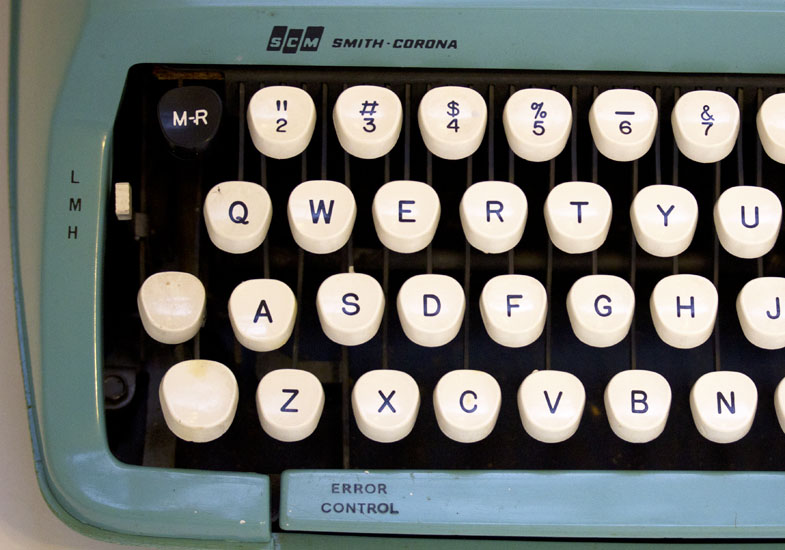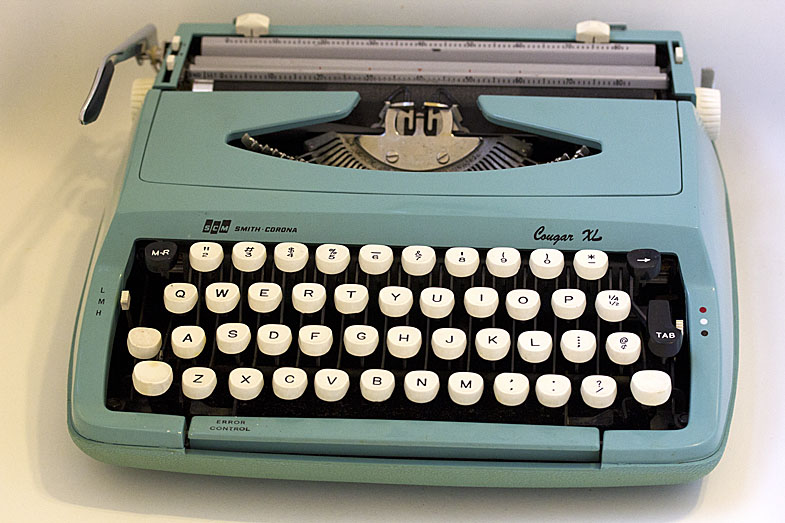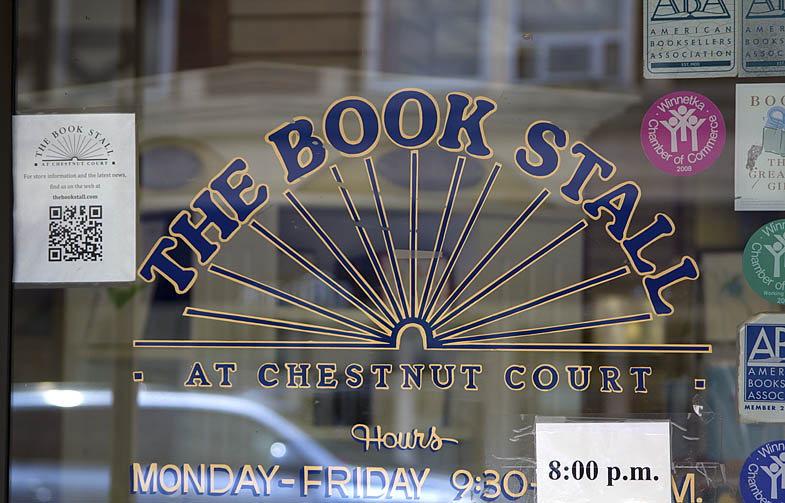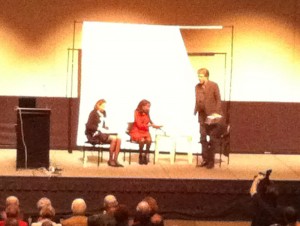The typewriter I donated to the Kurt Vonnegut Memorial Library has made its way to Ball State University in Muncie, IN, where it’s part of a traveling exhibit celebrating the author’s work. The blue beauty appears repeatedly in the BSU-produced video featured here.
So it goes … to the Kurt Vonnegut Memorial Library
I’d been holding on to my grandparents’ old manual typewriter for 10-plus years, regarding it as a cherished if no longer functional possession. As a writer, I valued its purpose. And as a sentimental fool, I appreciated its connection not just to my beloved grandmother and grandfather but also to a time of fewer distractions and more focused, carefully considered communication.
The Kurt Vonnegut Memorial Library recently posted on its Facebook page that it was looking for a 1960s-era Smith-Corona manual typewriter, preferably a blue one, to use in an exhibit. Reading the post, and in spite of my fondness for that old Cougar XL, I knew it was time to say goodbye to my grandparents’ typewriter. I never used it; the powder-blue beauty sat in a dark corner of my attic. Without question, it would be better off as a centerpiece in an exhibit celebrating the work of Kurt Vonnegut.
Before shipping the typewriter to the library, I positioned it in a bathtub and took this photo. I’m sad to see it go, but I’m thankful it will assist in telling the story of a great American author.
For Sale: 2012 Bookstore of the Year
A month after being named Bookstore of the Year by Publishers Weekly, The Book Stall at Chestnut Court announced that it’s up for sale. The news is a blow to Chicago’s literary community, as the indie bookseller sponsors more than 400 in-store and offsite events each year.
Yesterday I showed some support for the The Book Stall by stopping by to purchase Nell Freudenberger’s latest effort. I rarely buy books at brick-and-mortar stores these days, and when I do — paying full price plus sales tax — it feels, I’m embarrassed to admit, like an act of altruism. Of course, in 2012 the truly altruistic act is not buying a book, it’s buying a bookstore.
Literature matters: Large crowd gathers for Heartland Prize winners Wilkerson and Franzen
The Chicago Tribune has awarded its Heartland Prizes to some of the biggest names in contemporary literature: Ann Patchett, Studs Terkel, Jane Smiley, Marilynne Robinson and Scott Turow, to name but a few past honorees. The annual awards, one for fiction and one for nonfiction, recognize authors whose books embody “the spirit of the heartland.”
This year’s nonfiction winner is Isabel Wilkerson for The Warmth of Other Suns, a richly detailed account of America’s Great Migration, the period from 1915 to 1970 in which millions of blacks left the South in pursuit of a better life in cities such as Chicago, New York and Philadelphia. Wilkerson, who is the first black woman to win the Pulitzer Prize in the history of American journalism, conducted an exhaustive total of 1,200 interviews over the 15-year stretch she spent writing the book.
Jonathan Franzen, whose literary star burns bright despite — or perhaps, in part, because of — his aloof disposition and nonprolific-writing ways, earned the fiction award for Freedom, his best-selling follow-up to 2001’s The Corrections.
Wilkerson and Franzen were celebrated yesterday at a Q&A and book-signing at the University of Illinois at Chicago. The event began with acceptance speeches from both writers. Wilkerson dazzled during her remarks, speaking from the heart and exhibiting tremendous eloquence and grace. As for Franzen, he was, well, Franzen-esque. He devoted the bulk of his speech to reading a passage from an essay he wrote about New York for an anthology called State by State. During the Q&A segment, he was somewhat cryptic and obtuse, albeit with a degree of charm. Even after 10 years in the media spotlight, it’s clear that he’s uncomfortable being the center of attention, a point that was underscored when, the moment that Taylor began to wrap up the event by thanking everyone, he jumped from his seat and headed off the stage (see the fuzzy photo included here).
In his opening comments, Franzen admitted that he found talking about his craft challenging. “It’s hard to talk about fiction,” he said. “It seems so frivolous. I’m merely trying to give you a good time.”
One of his more interesting responses was to a question from Taylor about how his upbringing in St. Louis, a town that borders the North and South, informed his writing. Here’s his response:
“I think I experienced the borderness of St. Louis as an indeterminancy. … That borderness, I think I got it from other sources on my own sense of personal indeterminancy, but it was heightened by a feeling that we were nowhere — in a good way. There was a certain amount of safety from being nothing, being not any particular thing. You can just have your own life. It was accentuated by being in the suburbs. That was the whole point of the suburbs as far as I can tell. None of this ethnocultural noise to interfere with the having of a good upbringing and a happy childhood.”
I had seen Franzen once before, at a book festival in Indianapolis in September 2001, the weekend after the 9/11 tragedy. Only a handful of people showed up for that reading and book-signing, even though The Corrections had just published and had the literary world all abuzz. I’m certain that 9/11 was the main reason why the crowd was so sparse; novels, and just about everything else, seemed frivolous at the time. At the same festival I recall seeing basketball legend Isiah Thomas, who had just published an autobiography, seated behind a large table in an empty room, not another person in sight, looking diminutive and sad with a stack of books at his side. At least Franzen had a few people at his event.
Yesterday, hundreds of people paid $15 to gain literary insights from Franzen and Wilkerson (though I was more impressed by Wilkerson, I acknowledge that Franzen was the gathering’s main draw). Noting the stark difference between yesterday’s crowd and the one in September 2001, I recognized, happily and hopefully, that literature still matters to people.



